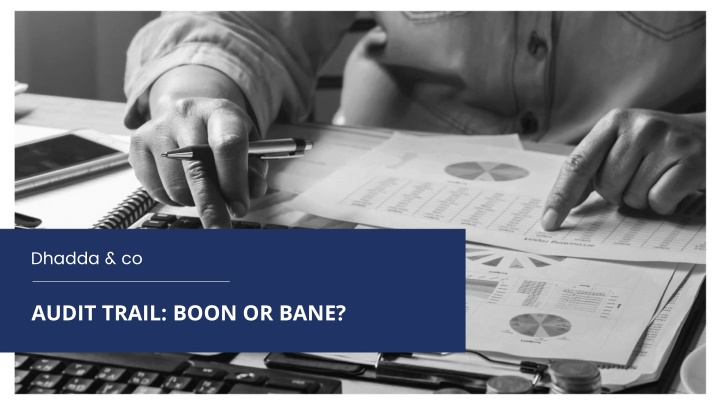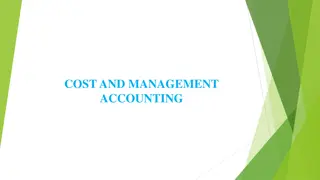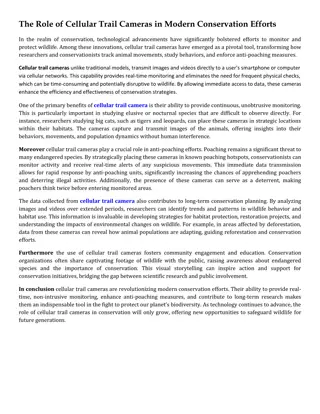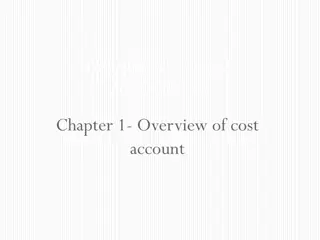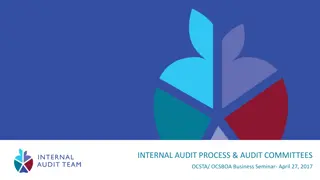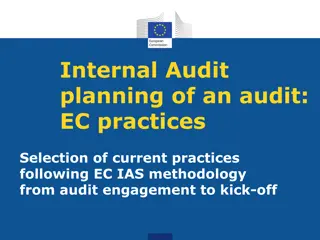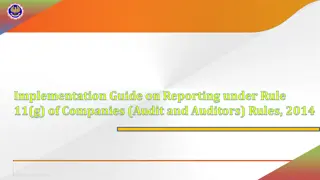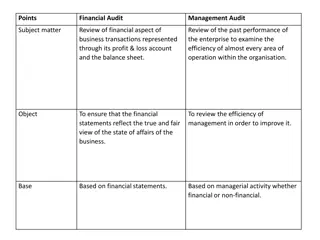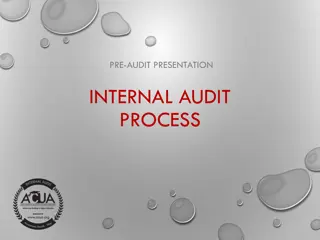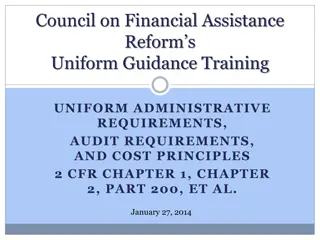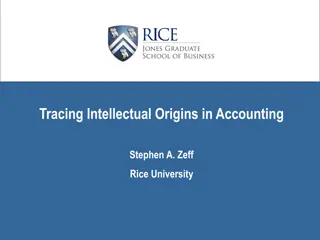Audit Trail in Accounting: Boon or Bane?
The article delves into the significance of maintaining an audit trail in accounting, focusing on recent amendments requiring companies to use accounting software with audit trail features. It discusses the implications for auditors and the distinction between manual and electronic record-keeping. The importance of preserving the audit trail as per statutory requirements is highlighted.
Download Presentation

Please find below an Image/Link to download the presentation.
The content on the website is provided AS IS for your information and personal use only. It may not be sold, licensed, or shared on other websites without obtaining consent from the author.If you encounter any issues during the download, it is possible that the publisher has removed the file from their server.
You are allowed to download the files provided on this website for personal or commercial use, subject to the condition that they are used lawfully. All files are the property of their respective owners.
The content on the website is provided AS IS for your information and personal use only. It may not be sold, licensed, or shared on other websites without obtaining consent from the author.
E N D
Presentation Transcript
Dhadda & co AUDIT TRAIL: BOON OR BANE?
Proviso to Rule 3(1) Companies (Accounts) Rules, 2014 - Amendment Provided that for the financial year commencing on or after the 1st day of April 2023, every company which uses accounting software for maintaining its books of account, shall use only such accounting software which has a feature of recording audit trail of each and every transaction, creating an edit log of each change made in the books of account along with the date when such changes were made and ensuring that the audit trail cannot be disabled.
Rule 11(g) of Companies (Audit and Auditors) Rules, 2014 For Auditors Whether the company, in respect of financial years commencing on or after the 1st April, 2022, has used such accounting software for maintaining its books of account which has a feature of recording audit trail (edit log) facility and, the same has been operated throughout the year for all transactions recorded in the software and, the audit trail feature has not been tampered with and the audit trail has been preserved by the company as per the statutory requirements for record retention.
Manual Books Progressive or Regressive? The requirements of audit trail are applicable to the extent a company maintains its records in the electronic form by using an accounting software. Thus, where the books of account are entirely maintained manually the assessment and reporting responsibility under Rule 11(g) will not be applicable and accordingly, same would need to be reported as statement of fact by the auditor against this clause.
Books of account Books of account includes records maintained in respect of all sums of money received and expended by a company and matters in relation to which the receipts and expenditure take place; a) all sales and purchases of goods and services by the company; b) the assets and liabilities of the company; and c) the items of cost as may be prescribed under section 148 in the case of a company which belongs to any class of companies specified under that section; d)
Accounting Software (As per Implementation Guide) Accounting Software is a computer program or system that enablesrecording, maintenance and reporting of books of account and relevant ecosystem applicable to business requirements. The functionality of such accounting software differs from product to product. Every organization today employs multiple software for accounting, its operations and other requirements like consolidation, collection of data. For the purposes of this Implementation Guide, only the accounting software which is relevant for maintaining books of account should be considered for enabling of audit trail.
Global Guidance Globally, no similar reporting obligation exists for the auditors and accordingly there is no international guidance available on the subject to prescribe specific guidance to enable the auditor to obtain reasonable assurance and report accordingly under this clause. Yes, we are front runners in implementing this!!
Managements Responsibility Records an audit trail of each and every transaction, creating an edit log of each change made in the books of account along with the date when such changes were made a) Ensuring that audit trail is not disabled. b)
Internal Controls a. The audit trail feature has not been disabled or deactivated. b.User IDs are assigned to each individual and that User IDs are not shared. c. Changes to the configurations of the audit trail are authorized and logs of such changes are maintained. d.Access to the audit trail (and backups) is disabled or restricted and access logs, whenever the audit trails have been accessed, are maintained. e. Periodic backups of the audit trails are taken and archived as per the statutory period specified under Section 128 of the Act.
Software and Audit Trail Any software used to maintain books of account will be covered within the ambit of this Rule. Companies are required to maintain audit trail (edit log) for each change.
Auditors Responsibility a) whether the audit trail feature is configurable (i.e., if it can be disabled or tampered with)? b) whether the audit trail feature was enabled/operated throughout the year? c) whether all transactions recorded in the software are covered in the audit trail feature? d) whether the audit trail has been preserved as per statutory requirements for record retention?
Audit Considerations The auditor may take into consideration the following aspects for every accounting software which is used in maintaining the books of account for the purpose of reporting: a. the software configuration that controls enabling or disabling of the audit trail and whether audit trail was enabled throughout the period. b. the access to such configurations. c. any changes to the audit trail configuration during the period of audit (during the financial year and also from the date of financial statements but before the date of auditor s report). d. the periodic review mechanism implemented and operated by management for any changes to the audit trail configuration. e. the completeness and accuracy of audit trail or edit logs that are generated through the software functionalities or directly recorded in the underlying database i.e., whether it captures the user ID that made the change, the date and time of change and what fields were changed by reviewing the reports or trails generated, on a test basis, to capture the required information or when the audit trail feature was disabled, etc. f. any testing management has performed to assess the completeness and accuracy of the audit trail.
Audit Approach a) Identify the records and transactions that constitute books of account under section 2(13) of the Act; b) Identify the software i.e., IT environment including applications, web-portals, databases, Interfaces, Data Warehouses, data lakes, cloud infrastructure, or any other IT component used for processing and or storing data for creation and maintenance of books of account; c) Ensure such software have the audit trail feature; d) Ensure that the audit trail captures changes to each and every transaction of books of account; information that needs to be captured may include the following: i. when changes were made, ii.who made those changes, iii.what data was changed,
Audit Approach contd.. e) Ensure that the audit trail feature is always enabled (not disabled); f) Ensure that the audit trail is enabled at the database level (if applicable) for logging any direct data changes; g) Ensure that the audit trail is appropriately protected from any modification; h) Ensure that the audit trail is retained as per statutory requirements for record retention; i) Ensure that controls over maintenance and monitoring of audit trail and its feature are designed and operating effectively throughout the period of reporting.
Audit Trail - Scenarios In respect of audit trail, following are likely to be expected scenarios: a. Management may maintain adequate audit trail as required by the Account Rules. b. Management may not have identified all records/transactions for which audit trail should be maintained. c. The accounting software does not have the feature to maintain audit trail, or it was not enabled throughout the audit period. Scenarios (b) and (c) mentioned above would result in a modified/adverse reporting against this clause.
Softwares In case of accounting software supported by service providers, the company s management and the auditor may consider using independent auditor s report of service organisation for compliance with audit trail requirements. The independent auditor s report should specifically cover the maintenance of audit trail. Most of the commonly used accounting software, including ERP software, have an audit trail feature that can be enabled or disabled at the discretion of the company. The management of the company may have put in place certain controls such as restricting access to the administrators and monitoring changes to configurations that may impact the audit trail. Auditor to evaluate this.
Applicability & Requirements Audit reporting will be triggered for financial years commencing on or after April 1, 2022, however, the applicability of the Account Rules will commence on or after April 1, 2023. Suggested para for current year - As proviso to rule 3(1) of the Companies (Accounts) Rules, 2014 is applicable for the company only w.e.f. April 1, 2023, reporting under this clause is not applicable. The reporting requirements have been prescribed for audit of financial statements prepared under the Act including section 8 companies. As per the Companies (Registration of Foreign Companies) Rules, 2014, the provisions of Chapter X of the Act: Audit and Auditors and Rules made there under apply, mutatis mutandis, to a foreign company as defined in the Act.
Reporting The auditor is required to comment both in case of standalone financial statements and consolidated financial statements. While reporting on CFS, the auditor may observe that certain components included in the consolidated financial statements are (a) either not companies under the Act, or (b) some components are incorporated outside India. Preservation of Audit Trails - The auditor is required to comment whether the audit trail has been preserved by the company as per the statutory requirements for record retention . The company would need to retain audit trail for a minimum period of eight years i.e., effective from the date of applicability of the Account Rules (i.e., currently April 1, 2023, onwards).
Penalty for Contravention As per section 128(6) If the MD, WTD (Finance), the CFO or any other person of a company charged for complying with the provisions of this section Contravenes such provisions shall be punishable with fine which shall not be less than fifty thousand rupees but which may extend to five lakh rupees
Threat or Opportunities? Best Judgement Assessment Can this be triggered? Petty Cash Expenses Entered once in year/ month? Post Dated Entries vs Real Time Entries? Penalty for not maintaining Audit Trail? What about Payroll Software s? Excel Based Workings? Accounting Software vs Software? How can it impact us as an Auditor?
Dhadda & Co. dhaddaonline.com email@dhaddaonline.com DIRECT: 0141-2724952 MOBILE: +91-7506646230 Dhadda & Co. 14/33, Malviya Nagar, Jaipur-17 Compiled by : Somya Jain
